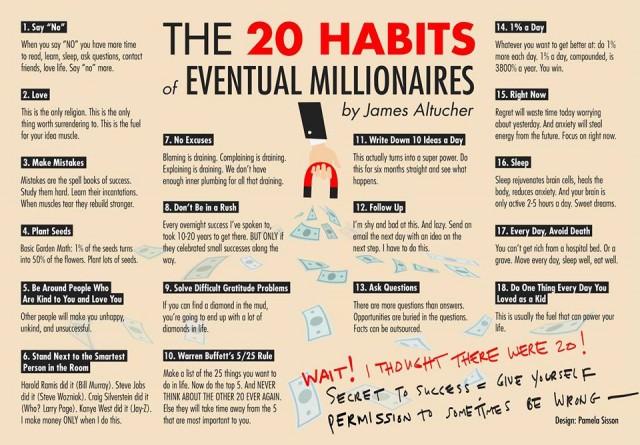What do you think about when you hear the term millionaire?

If you are like a lot of people, the term millionaire conjures up images of suit-wearing men and executive put together women living in ritzy parts of town and driving nice cars.
But, that's not the whole story. In fact, that's not even half the story.
It's true that some millionaires do live glamorous lifestyles full of expensive things and drive nice cars, shop at expensive stores and do all those things that you might expect millionaires to do. Some definitely try to look the part.
But, not all of them. In fact, you might be surprised to find out how many millionaires are just like you and me. They might even be your next door neighbor.
What do millionaires look like?
Here is what we know about most millionaires. They likely have a college degree. In fact, about eight in 10 hold some type of degree.
Where do they shop for their food and things for their home? Not where you might expect.
According to this poll, millionaires love Costco and Home Depot.
"New research finds that high-income consumers even love the private-label goods at Costco, with 38% saying they believe them to be comparable to name-brand items. Among homes with more than $150,000 in annual income, that opinion rises to 44%, the highest of all income segments."
Interesting! Not all that different from you and me, right?
Also, inheriting wealth is definitely the exception rather than the rule. Fidelity found that almost 90% of millionaires are self-made and nearly three in 10 of millionaires were raised in families that struggled financially.
In fact, it takes the average self-made millionaire more than 30 years to get rich, according to Rich Habits author Thomas Corley. Corley also found that almost 90% of millionaires read one to two books a month.
What types of cars do you think millionaires drive? Most don't zip around in $80,000 cars. "Among those earning more than $200,000 per year, the most popular new vehicle to buy is a Ford F-150. The pickup truck is a blue-collar favorite, and the overall best-selling vehicle in America year after year," wrote Time.
"Next came the Jeep Grand Cherokee, Honda Pilot, Jeep Wrangler and the only compact car in the top five, the humble Honda Civic," USA Today reported.
They also tend to be just as stressed out as the rest of us. "Most of the millionaires responding to a survey say their life has them 'stuck on a treadmill they can't get off' just to maintain their current standard of living."
"63 percent of working millionaires who responded believe that one major setback, such as lost job or a market crash, would have a major impact on their lifestyle.
High incomes don't always make it easy to get rich. And, they worry about their financial health just like the rest of us.
Lastly, did you know that Maryland has more millionaires per capita than any other state? That's just a fun fact - we all don't live in Maryland. :)

Are millionaires who "look the part" pseudo-affluent?
Some are. Some aren't. But, the fact remains that pseudo-affluence has a devestating affect on our bottom lines.
The pseudo-affluent is a breed that fancies our material world by buying things that convey success. Author Dr. Thomas Stanley calls these items “prestige products”. And, the majority of these people want us to know just how much stuff they have by displaying their success (apparently, that’s like half the fun!).
The expensive cars, big homes, and assorted collection of Guuci-acquired clothing present a chosen facade, one that supposedly portrays wealth and success. Intelligence. Status.
A belief that wealth must be displayed keeps high-income earners effectively poor. When the large majority of a high income is spent on things, we position ourselves into a spiral of weakness where we need that income just to satisfy the financial demands of our lifestyle.
But, I want to be clear: Not everyone who displays their wealth is pseudo-affluent. Some people who wear $2500 suits and live in 10,000 square foot mansions are quite wealthy. And, some are stuck in a high-income career that nearly requires that level of spending just to keep up.
However, it takes considerable wealth to be able to spend like that and still be wealthy. It happens, but according to the numbers, it's not quite as often as you might think. Millionaires live paycheck-to-paycheck too.
And those of us who are genuinely wealthy - having a net worth north of a million, look in large part just like you and me.
What do real millionaires look like?
By "real millionaires", I am talking about people with a net worth of over a million. Not just high-income earners. But, people who saved enough to amass over a mil to their name. Those people who don't live paycheck-to-paycheck.
What do these people do?
They manage their time appropriately - they spend time doing the things that will most likely benefit them (both in the short term as well as the long term). They are okay saying "no" to things that don't bring them value.
They invest and save - this goes without saying, but I will say it anyway. Millionaires invest their money because they want a return on their dollar. They prioritize appreciating assets over depreciating ones.
They spend money only on what's important - millionaires aren't cheap people. They are frugal, though. They don't waste their money on things that don't bring them genuine happiness. That means if an expensive car happens to provide happiness, they buy it. But, they may not buy the big house in the nice neighborhood if that isn't important - especially if that house would put them into a position of financial weakness.
They are not afraid to ask for help- asking for help transformed the way that I went through my life. Once I finally admitted to myself that I didn't have to do everything by myself - that I could ask for help when I needed it, things magically began to fall into place. I began to build a support network. I started to surround myself with those people who were smarter than I was. It's a humbling experience, but one that changed my life for the better.
I will leave you with one of my favorite infographics about the 20 habits of eventual millionaires. This one is from the one and only James Altucher:
